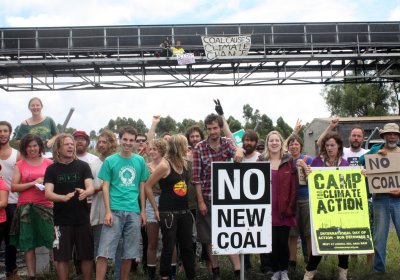The Australian subsidiaries of tobacco giants Philip Morris and British Tobacco lost their final court challenge on August 16 against the Australian government’s proposed legislation that mandates all tobacco products be packaged in plain packaging. The only distinguishing features on packs will be the brand names, which will be in a standard font and size.
Brianna Pike
Seventy-three people who took part in a non-violent direct action protest during December’s Climate Camp appeared in Muswellbrook local court on January 31 to answer to charges under the Rail Safety Offences Act.
Hundreds of climate protesters gathered at Climate Camp for five days of talks, debates and discussions on the best ways for the community to stop the proposed expansion of Bayswater coal-fired power station. The station is already one of Australia’s largest sources of greenhouse gas emissions.
Thirty people gathered on May 6 at a meeting organised by the National Tertiary Education Union (NTEU) and the New South Wales Teachers Federation (NSWTF). The theme of the meeting was “Trade Unions and Climate Change: Challenges, Opportunities and Alliance Building”.
Jeremy Kerbel, climate justice campaigner with the Liquor, Hospitality and Miscellaneous Union, outlined some of the LHMU’s climate change initiatives, such as calling hundreds of delegates in the lead-up to the 2009 Walk Against Warming and sponsoring the event.
Young people today are angry: there are major and urgent problems in our society including global food shortages, a rise in oil prices — which will send millions into greater poverty — and the build-up of greenhouse gas emissions.
While we heralded the end of the Howard regime, those of us involved in the many campaigns for social and environmental justice knew the fight had not ended with his demise. We knew the struggle for real and lasting justice would go on, and this is why it is important that we stay inspired and active.
Plans are under way for the 2008 Resistance national conference, to be held at the University of Technology, Sydney from June 27-29. This year’s theme is: “war, racism, environmental destruction, homophobia, sexism … Turn anger into action!”
For over a decade now, Australian universities have been under attack. PM John Howards whittling away at the public funding of tertiary education came to a head in 2005, with the implementation of the Nelson Review. The review promoted a shift away from government funding of universities, which meant that they had to seek funding elsewhere fee-paying students and big business.
There is no time to waste in the fight against climate change. The national Walk Against Warming (WAW) protests on November 10-11 mobilised thousands of people. In most major cities they were joined by sizeable youth blocs.
It isn’t hard to see why Che Guevara retains his relevance today. The need for the victory of ideas that Che fought for, his vision of a better world, the struggle for human liberation, has never been so great. Following the legacy of Che, revolution is once again back on the agenda in Latin America, led by Venezuela, showing that you can kill the revolutionary, but never the revolution.
US President George Bush will add Sydney to the long list of cities that have greeted him with mass demonstrations demanding an end to the war on Iraq. PM John Howard will remember APEC as the summit that failed to bolster his domestic support.
The world that we live in is crumbling around us. Imperialist nations such as the US use fear and violence as a means to an end an end that favours the interests of the rich and the powerful. The Iraq war provides an example: Had Iraq been the worlds biggest producer of, say, potatoes, and not oil, Saddam Hussein would have been left to his misguided, vegetable-driven devices.
The fact that we live in a sexist society was brought home in July by the publication of a study titled Youth Cultures of Eating, which found that one in five women suffer from an eating disorder. The study, funded by the Australian Research Council, compared data collected in 2000 and 2006 from interviews with 8950 young people.
- Page 1
- Next page

